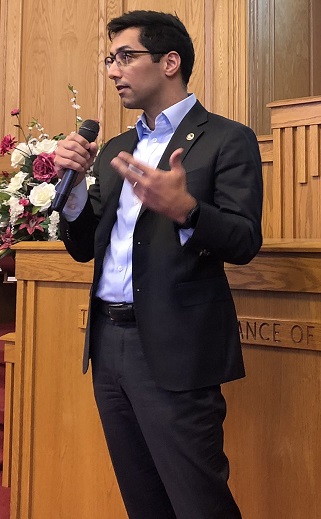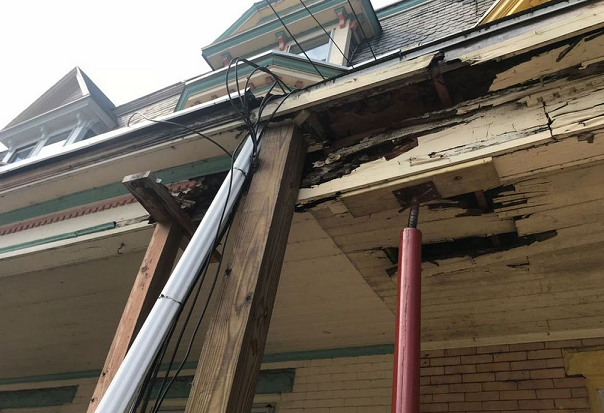Mayor Justin Bibb Proposes Balancing Cleveland Budget By Cutting Vacant Positions!
FEATURED PHOTO: CLEVELAND MAYOR JUSTIN BIBB

,
SignalCleveland.org, By Nick Castele, Posted February 15th 2023
Cleveland Mayor Justin Bibb’s latest $1.9 billion budget proposal eliminates hundreds of vacant positions – leaving the city in the black amid labor shortages and rising costs.
The mayor is proposing to spend $711 million from the city’s General Fund, covering those expenses with about as much in revenue.
Cleveland Mayor Justin Bibb’s latest $1.9 billion budget proposal eliminates hundreds of vacant positions – leaving the city in the black amid labor shortages and rising costs.
The mayor is proposing to close out vacant posts in police, EMS, Public Works, Building and Housing and elsewhere throughout the city’s general operations. The budget maintains a narrow balance of spending, with General Fund revenues just $225,000 more than expenses.
Democracy needs local journalism
Signal Cleveland’s journalism holds the people in power accountable. Your donations make that possible.
Bibb’s budget would spend almost $711 million from the General Fund, which covers basic city operations. Overall, the General Fund includes 252 fewer jobs than the 2022 budget called for, according to Finance Director Ahmed Abonamah.
“As we look ahead, we are focused on several critical initiatives, including violence prevention and public safety, east side neighborhood development, transforming our beautiful lakefront, and the search for the next CEO of the Cleveland Metropolitan School District,” Bibb wrote in a letter accompanying the proposal. “We will continue improving our processes and delivering on high-quality city services while implementing bold policies and programs that improve our city and-most importantly-the lived experiences of our residents.”
Last year’s budget passed with a $62 million imbalance covered with federal coronavirus aid.
At a sparsely attended public meeting on the budget Wednesday evening, Finance Director Ahmed Abonamah said that revenues were not enough to support the full headcount from last year’s budget. Though the city is closing vacancies, it is not proposing to lay off workers.
“These positions were vacant,” he said. “No one lost their job in this process.”
About 650 vacant positions remain in the latest budget proposal. The budget lists vacancies by department but not by job title – a change in the format from prior years’ budgets.

Bibb will present his budget to Cleveland City Council on Feb. 14, kicking off weeks of hearings on the latest spending plan.
Council President Blaine Griffin told Signal Cleveland he had only taken a cursory look at the proposal so far. He said he would focus on making sure the city can deliver quality services with the reduced headcount.
“There’s some dramatic shifts that we’re really going to have to examine,” Griffin said. “At the end of the day, we’re still going to make sure that public service is our bottom line. We’re not trying to make a profit, but we do want to make sure that the citizens are still getting good quality service.”
Safety forces
Bibb is proposing to spend almost $382 million on public safety this year, or 54% of the General Fund budget. Of that spending, almost $218 million would go to the Division of Police – a decrease from the $223 million in last year’s budget.
The division has struggled to hire enough officers to keep pace with retirements and resignations. It spent only $211 million of its 2022 budget, as hundreds of police jobs remained empty.
The 2023 budget includes 1,498 sworn police officers, including 206 positions that are listed as vacant. That’s a decrease from the 1,640 positions in last year’s budget. But actual police staffing numbers are far lower: 1,292 sworn officers worked for the city at the end of 2022, according to the budget proposal.

This budget cuts 28 vacant positions from EMS staffing, reducing the budgeted headcount from 332 to 304. Another 49 jobs are listed as vacant.
The mayor’s proposal is already receiving pushback. The Cleveland Association of Rescue Employees – the union that represents EMS workers – pointed out on social media that the city raised ambulance rates even as it reduced headcount.
“Why are citizens paying more for less EMS?” the union wrote.
Other services
The budget would cut 10 positions from the Department of Building and Housing, which enforces city building codes. That includes a cut of seven jobs from the code enforcement division, leaving 15 vacant positions in the budget.
Bibb is proposing some staffing increases. The budget would grow the Division of Health Equity and Social Justice – a health department office created in 2020 – from four budgeted employees to 11. Currently, the division has only one worker on the payroll: the commissioner, Lita Wills.
That staffing change is offset but cuts of vacant jobs elsewhere in the Health Department, resulting in an overall head count decrease of three.
Revenues
The administration expects to bring in $470 million this year in income taxes, the largest single source of General Fund revenue. That’s a 2% increase over last year’s $463 million in collections.
Bibb is also balancing the budget with a $4.5 million transfer into the General Fund, described in the estimate as “income from land sales at Chagrin Highlands and Economic Development.”
According to a draft of council’s budget schedule for the year, council anticipates voting on the 2023 appropriations in the latter half of March.








